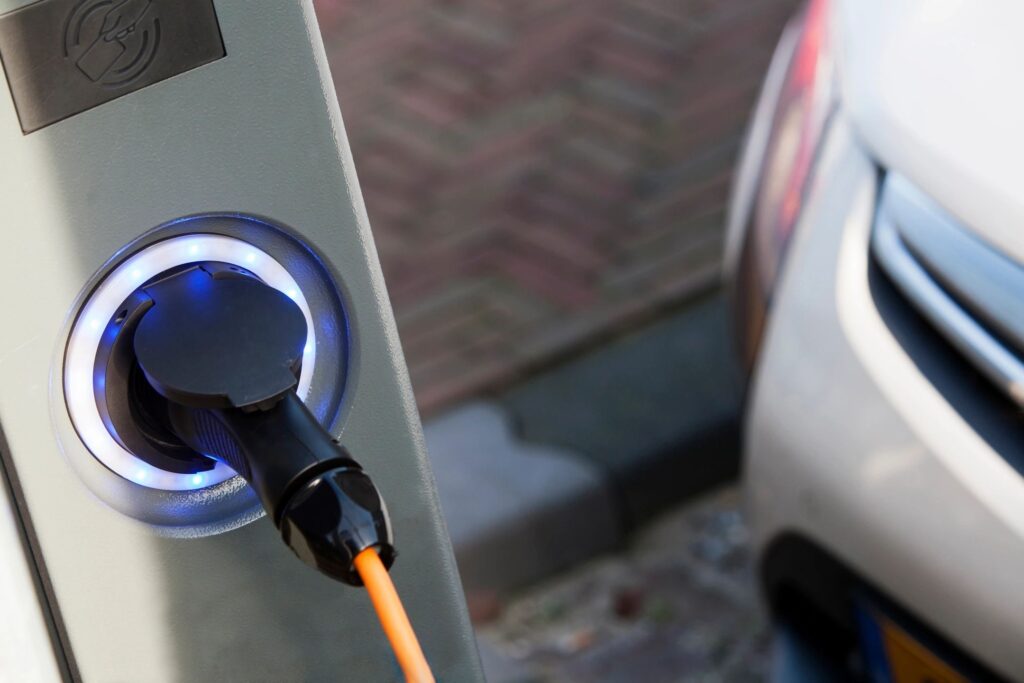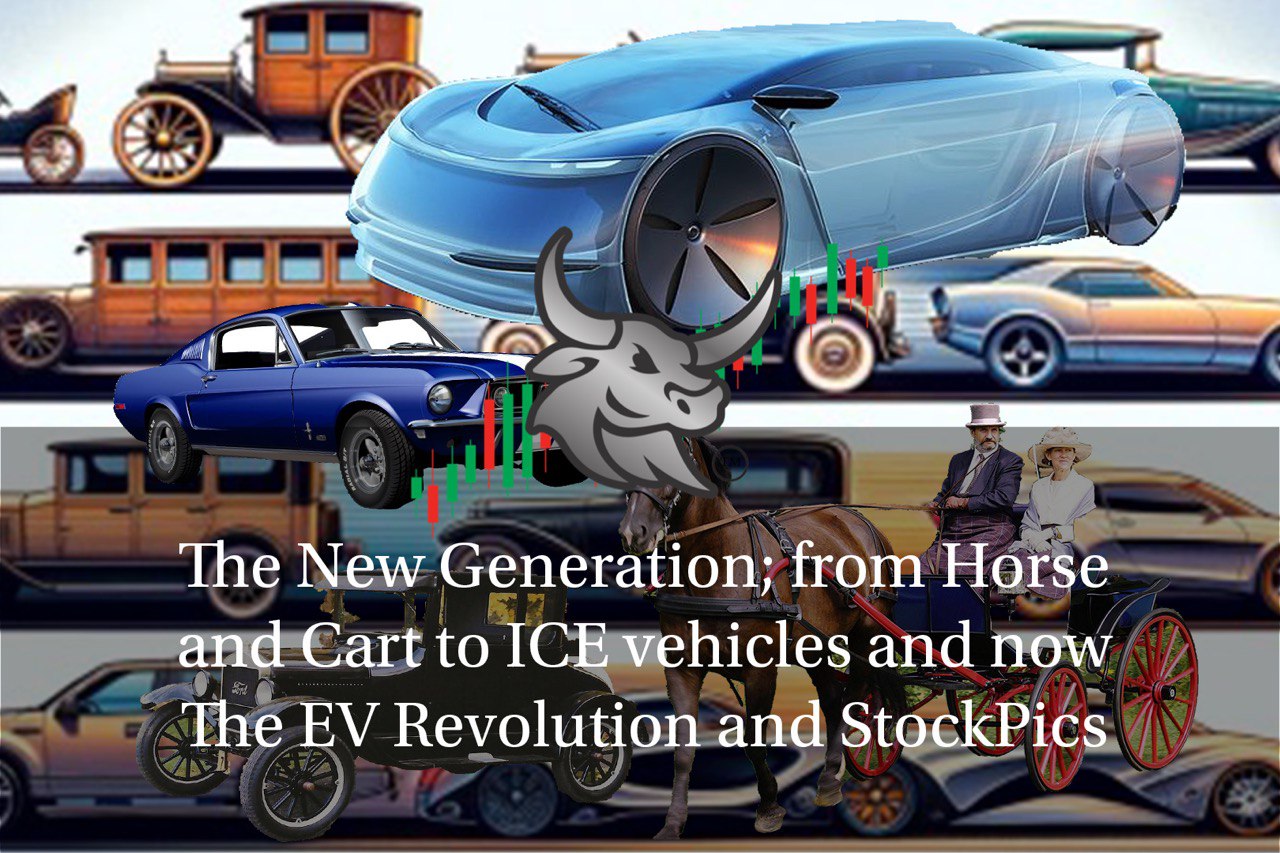6 of 6: A six (6) Article Series On The Evolution of the Automobile, From ICE to EV Powered Vehicles by 2035, The Transformation Years and Dependence on Lithium Powered Batteries!
The automotive industry stands at the cusp of a technological revolution that promises to reshape our modes of transport, our cities, and even our economy. This article delves into the innovations set to define the next decade, focusing on electric vehicles (EVs), advancements in battery technology, the rise of autonomous driving, and the integration of AI and 5G technology.
The automotive industry is undergoing a seismic shift as it integrates cutting-edge technologies and responds to global economic and environmental demands. As we look ahead to the next decade, several key innovations promise to redefine the landscape of transportation, from electric vehicles (EVs) to advanced manufacturing techniques and artificial intelligence (AI). This article will explore these transformative trends and their implications for the future.

Lithium and Rare Earth Metals: The New Oil
The rise of EVs has shifted the strategic importance from oil to lithium and rare earth metals, crucial components for EV batteries. China has taken a commanding lead in this domain, with companies like Ganfeng Lithium and Zijin Mining dominating the supply chain. Ganfeng, one of the world’s largest lithium producers, has secured substantial lithium resources globally, ensuring a steady supply to meet rising EV demands.

Emerging players like Brunswick Exploration  and Patriot Battery Metals are also making significant impacts in the lithium space. Brunswick Exploration is actively exploring and developing lithium projects across Canada, while Patriot Battery Metals has extended its lithium pegmatite deposits in Quebec, highlighting the region’s potential as a lithium hotspot (GlobeNewswire) (Mining).
and Patriot Battery Metals are also making significant impacts in the lithium space. Brunswick Exploration is actively exploring and developing lithium projects across Canada, while Patriot Battery Metals has extended its lithium pegmatite deposits in Quebec, highlighting the region’s potential as a lithium hotspot (GlobeNewswire) (Mining).
Watch the YouTube video below as CEO Killian Charles puts his old analyst cap back on and educates us on the mining and lithium industry, if you’re investing in the mining industry, its a must watch video!

Call me for a free estimate in the Greater Montreal Area.
Autonomous Vehicles and Connectivity
The future of automotive technology is not just electric but also autonomous. Autonomous vehicles (AVs) are being developed and tested worldwide, promising to revolutionize transportation by reducing accidents, easing traffic congestion, and providing greater mobility for those unable to drive. Companies like Waymo, a subsidiary of Alphabet, and China’s Baidu are making significant strides in AV technology.
Connectivity is another crucial area, with the advent of 5G technology enabling faster and more reliable communication between vehicles and infrastructure. This connectivity is essential for the development of smart cities and the broader Internet of Things (IoT) ecosystem, where vehicles will interact seamlessly with their surroundings to optimize traffic flow and enhance safety.

Geopolitical Implications and the Economic Landscape
The global shift towards EVs and the decline of the petro-dollar have significant geopolitical implications. The dominance of China in the EV and battery supply chain poses a challenge to the traditional economic powers of the United States and Europe. As the world moves away from oil, these regions must adapt to maintain their economic influence.


The automation of the manufacturing process and the rise of AI are leading to a decline in traditional manufacturing jobs, eroding the middle class that Henry Ford’s assembly line helped create. With fewer jobs available in the manufacturing sector, societies must grapple with the economic and social implications, including the potential need for universal basic income (UBI) to support those displaced by technology.
Electric Vehicles and the Dominance of Lithium
Electric vehicles are no longer a futuristic concept; they are a present reality. Companies like Tesla, Rivian, and Lucid Motors in the USA; NIO, XPeng, and Li Auto in China; and ElectraMeccanica in Canada are leading the charge. These companies are driving innovation in EV technology, making electric cars more efficient, affordable, and accessible to the masses.
China, in particular, has become a global leader in EV production and technology. Companies like BYD, NIO, and XPeng are not only producing vehicles but are also pioneering advancements in battery technology. BYD, for instance, has introduced the LFMP (Lithium Iron Manganese Phosphate) battery, which promises over 1000 km of range, significantly reducing range anxiety. This battery is also safer and more cost-effective compared to traditional lithium-ion batteries (EVAdoption |) (The China Project).

In addition to vehicle production, Chinese companies are securing their dominance by controlling the supply chain of critical materials. Ganfeng Lithium and Zijin Mining are key players in the lithium and rare earth metals market, essential for battery production. These companies have extensive mining operations globally, giving China a significant edge in the EV market (The China Project).

Autonomous Driving and AI Integration
The integration of artificial intelligence (AI) and 5G technology is transforming the automotive industry. Autonomous vehicles (AVs) are becoming more sophisticated, with companies like Waymo, Tesla, and Baidu leading the development. These vehicles use AI to navigate, make decisions, and communicate with each other and the infrastructure around them.
5G technology plays a crucial role in the development of AVs by providing the necessary bandwidth and low latency for real-time data processing and communication. This technology enables features like vehicle-to-everything (V2X) communication, which allows cars to interact with traffic lights, road signs, and other vehicles, enhancing safety and efficiency on the roads (EVAdoption |).

Innovations in Battery Technology
Battery technology is at the heart of the EV revolution. Companies like CATL and Gotion in China are making significant strides in this area. CATL’s recent breakthrough in LFP battery technology offers a longer range and improved safety, positioning them at the forefront of the industry. Gotion is already putting 1000 km range vehicles on the market, with their LFMP battery technology addressing one of the major concerns of potential EV buyers—range anxiety (The China Project).
The future also holds promise for solid-state batteries, which offer higher energy density and are safer than current lithium-ion batteries. These batteries could potentially revolutionize the EV market by providing even longer ranges and faster charging times, for a good example what awaits us click here.

Battery technology is a critical area of innovation for the automotive industry. Chinese companies BYD and CATL are leading advancements with their development of Lithium Iron Manganese Phosphate (LFMP) batteries. These batteries offer over 1,000 kilometers of range and enhanced safety, addressing the common concerns of range anxiety and battery safety. Gotion High-Tech has already integrated LFMP batteries into vehicles, demonstrating the technology’s viability and market readiness.
The promise of solid-state batteries also looms large on the horizon. These batteries, which replace the liquid electrolyte with a solid material, promise higher energy densities and improved safety. While still in the development phase, they represent a significant leap forward in battery technology.
The Rise of Battery Swapping
One of the most innovative solutions to the problem of battery degradation and range anxiety is battery swapping. NIO, a Chinese EV manufacturer, has pioneered this technology. NIO’s battery swapping stations allow drivers to replace their depleted battery with a fully charged one in a matter of minutes.
This system not only reduces the wait time associated with charging but also ensures that drivers always have access to the latest battery technology through integrated battery management system (BMS) in the swapping station all verified by A.I. technology, as older batteries can be taken out of circulation and recycled (The China Project).
Geopolitical Implications and the Future of the Petro Dollar
The shift from fossil fuels to electric power has significant geopolitical implications. For decades, the global economy has been heavily reliant on oil, underpinning the petro dollar system. This system has given the United States significant economic leverage. However, as the world transitions to electric power, the demand for oil is set to decrease, potentially undermining the petro dollar’s dominance (The China Project).

Countries rich in lithium and other critical minerals, essential for battery production, could become the new power brokers. China’s dominance in the EV and battery market, along with its control over critical mineral supplies, positions it as a key player in the new energy economy. This shift could lead to a rebalancing of global power dynamics, challenging the economic hegemony of the United States and Europe (The China Project).
The Role of Robotics and AI in Manufacturing
The industrial assembly line, once revolutionized by Henry Ford, is undergoing another transformation. Robotics and AI are taking over tasks previously performed by humans, increasing efficiency and reducing costs. However, this shift has profound implications for the workforce. As robots and AI become more prevalent, the demand for human labor decreases, leading to a potential erosion of the middle class (EVAdoption |) (The China Project).
The automotive assembly line, pioneered by Henry Ford, has evolved dramatically with the advent of AI and robotics. Modern assembly lines are increasingly automated, reducing the need for human labor and boosting production efficiency. This transformation is reshaping the labor market, with profound implications for the middle class.
AI technologies are being integrated into various aspects of automotive manufacturing, from predictive maintenance to quality control. Robotics are handling more complex tasks, enabling precision manufacturing and reducing error rates. Companies like Tesla are at the forefront of this automation wave, employing AI-driven robots to streamline their production processes.
The rise of automation and AI in manufacturing raises important questions about the future of work. How will societies support those whose jobs have been displaced by technology? One proposed solution is the implementation of a universal basic income (UBI), providing everyone with a financial safety net. This idea, while controversial, is gaining traction as a possible response to the challenges posed by automation (The China Project).
A Dystopian Future? A Brave New World!
The technological advancements in the automotive industry and beyond have the potential to lead us into a future reminiscent of dystopian novels like George Orwell’s “1984” and Aldous Huxley’s “Brave New World.” The concentration of wealth and power in the hands of a few tech giants, combined with the erosion of the middle class, could create a society divided between a small elite and a large underclass.

The rise of digital currencies, such as central bank digital currencies (CBDCs), could further centralize control and reduce individual autonomy. These currencies, while offering greater efficiency and security, also raise concerns about privacy and government surveillance.
The future of automotive technology is both exciting and uncertain. As EVs become more prevalent, driven by innovations in battery technology and AI, the geopolitical and economic landscape will continue to evolve. The potential decline of the petro-dollar and the shift towards a new economic order underscore the need for adaptability and foresight.
As we navigate these changes, it is crucial to consider how technological advancements can be harnessed to benefit society as a whole. The introduction of UBI and other social safety nets may become necessary to ensure that the benefits of technological progress are shared broadly, rather than concentrated in the hands of a few.
The Road Ahead To 2035 and Important Dates to Rememeber
Several countries, states, and provinces around the world have committed to transitioning to 100% electric vehicles (EVs) and banning the sale of internal combustion engine (ICE) vehicles. Here are some of the key commitments:
- European Union: The EU has agreed to ban the sale of new ICE vehicles by 2035 as part of its “Fit for 55” climate package. This decision was supported by all member states except Italy, Poland, Romania, and Bulgaria (electrive.com) (ICCT).
- United Kingdom: The UK plans to ban the sale of new petrol and diesel cars by 2030. Additionally, all new cars and vans must be fully zero-emission by 2035 (Wikipedia).
- United States (California): California has set a target to sell only zero-emission new cars and light trucks by 2035. New York and New Jersey have announced similar goals, but these are not yet codified in legislation (Automotive World).
- Canada (British Columbia and Quebec): British Columbia aims to have 100% of new light-duty vehicle sales be zero-emission by 2040, while Quebec has set a similar goal for 2035 (Automotive World).
- China (Hainan Province): Hainan province plans to phase out the sale of new ICE vehicles by 2030, making it one of the most ambitious regions in Asia regarding this transition (Automotive World).
- Norway: Norway is leading the way globally, aiming to end the sale of new fossil fuel cars by 2025. This goal is supported by significant government incentives and has resulted in electric vehicles making up the majority of new car sales (Wikipedia).
- Israel: Israel has set a target to phase out new ICE vehicle sales by 2030, gradually increasing the share of electric vehicles in new sales over the coming years (Automotive World).
- Costa Rica: Costa Rica aims for 100% of new light vehicle sales to be zero-emission by 2050 as part of its National Decarbonization Plan (Automotive World).
- Colombia: Colombia has a law in place to progressively increase the share of electric vehicles in public transport fleets, aiming for 100% by 2035, although it lacks targets for other vehicle segments (Automotive World).
- Cape Verde: This African island state plans to prohibit the import of ICE vehicles by 2035, covering a wide range of vehicle types from passenger cars to heavy trucks (Automotive World).
These commitments reflect a growing global trend toward zero-emission vehicles, driven by the need to reduce greenhouse gas emissions and combat climate change.
The future of the automotive industry and its technological advancements hold both promise and peril. While innovations in EVs, battery technology, and AI have the potential to create a cleaner, more efficient world, they also pose significant challenges. The geopolitical landscape is shifting, the nature of work is changing, and societies must adapt to these new realities.

Publicly Traded COMPANIES RELATED TO the Electric VehicLE AND GEOPOlITICS
USA:
- Tesla, Inc. (TSLA) – The market leader in electric vehicles known for its high-performance electric cars and innovation in autonomous driving.
- Rivian Automotive, Inc. (RIVN) – Known for its electric pickup trucks and SUVs, backed by Amazon.
- Lucid Group, Inc. (LCID) – Focuses on luxury electric sedans with high range and performance.
- Nikola Corporation (NKLA) – Produces electric and hydrogen-powered trucks.
- Workhorse Group Inc. (WKHS) – Specializes in electric delivery vans and drones.
- Canoo Inc. (GOEV) – Developing a range of electric vehicles with a unique skateboard platform.
- Lordstown Motors Corp. (RIDE) – Focuses on electric pickup trucks.
- Polestar (PSNY) – Focuses on producing high-performance electric vehicles with emphasis on sustainability, cutting edge technology, with minimalist Scandinavian design.
Canada:
- ElectraMeccanica Vehicles Corp. (SOLO) – Known for its single-passenger electric vehicle.
- GreenPower Motor Company Inc. (GP) – Produces electric buses and commercial vehicles.
- Lion Electric Company (LEV) – Manufactures all-electric medium and heavy-duty urban vehicles.
China:
- NIO Inc. (NIO) – Known for its electric SUVs and sedans, and its innovative battery swapping technology.
- XPeng Inc. (XPEV) – Produces smart electric cars with advanced driving assistance systems.
- Li Auto Inc. (LI) – Focuses on electric SUVs with extended range technology.
- BYD Company Limited (BYDDY) – A major player in both electric vehicles and battery technology.
- Geely Automobile Holdings Limited (GELYF) – Produces a range of electric and hybrid vehicles.
- Great Wall Motor Company Limited (GWLLY) – Known for its electric and plug-in hybrid vehicles.
- SAIC Motor Corporation Limited (SAICF) – Produces a variety of electric vehicles through its partnerships.
- Leapmotor (9863.HK) – Focuses on affordable electric vehicles.
- Neta (Hozon Auto) – A newer entrant focusing on cost-effective electric vehicles.
- WM Motor (Weltmeister) – Produces affordable electric SUVs and sedans.
Major Players in the Lithium Supply Chain:
USA:
- Albemarle Corporation (ALB) – One of the largest lithium producers in the world, with operations in North and South America.
- Rio Tinto (RIO) – A significant player in the lithium supply chain and one of the worlds largest producers of essential minerals.
- Livent Corporation (LTHM) – A leading producer of lithium compounds for batteries.
- Piedmont Lithium Inc. (PLL) – Focuses on developing a domestic supply of lithium in North Carolina.
Canada:
- Lithium Americas Corp. (LAC) – Developing lithium projects in the USA and Argentina.
- Neo Lithium Corp. (NLC)(private) – Engaged in lithium exploration and development in Argentina.
- Standard Lithium Ltd. (SLI) – Focuses on lithium extraction from brine resources in the USA.
Hoping to add to this list is a few Juniors the Betweenplays community has their eyes on:
- Brunswick Exploration (Holds our highest rating as they are aggresively advancing the Mirage project with land packages across eastern Canada and Greenland)
- E3 Lithium (backed by imperial oil, the Alberta & Canadian Governments, need I say more)
- Frontier Lithium (hard rock deposit with proven reserves)
- Lithium Chile (massive land package in two countries in South America while advancing their Salar de Arizaro project in Argentina)
- Patriot Battery Metals (the monster of the Americas and still growing)
China:
- Ganfeng Lithium Co., Ltd. (GNENF) – A major global player in lithium extraction, refining, and battery production.
- Tianqi Lithium Corporation (TQLCF) – Another leading lithium producer with operations worldwide.
- BYD Company Limited (BYDDY) – Not only a significant EV manufacturer but also a key player in the battery and lithium supply chain.
- Zijin Mining Group Co., Ltd. (ZIJMF) – Recently expanding into the lithium sector with acquisitions and investments.
- Contemporary Amperex Technology Co. Limited (CATL) – The world’s largest EV battery manufacturer, heavily involved in lithium supply.
These companies are crucial in shaping the future of electric vehicles and battery technology, driving the shift towards sustainable transportation. The dominance of Chinese companies in both the EV market and the lithium supply chain poses significant geopolitical and economic implications for the global auto industry. The rise of EVs and the transition to renewable energy sources will continue to reshape the global economy and influence international relations in the coming decade.
Some other valuable mentions not related to lithium but to the EV Space are:
- Osisko Metals (Copper)
- First Phosphate (Phosphoric Acid for LFP and LFMP batteries)
- Manganese X (Manganese out of Woodstock New Brunswick)
- Canadian Nickel Company
- Gigametals
- Graphano
- Nouveau Monde Graphite
- Lomiko Metals
- Focus Graphite


